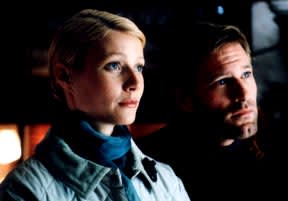Neil LaBute has taken a Booker award-winning (and perfectly bland) novel, Possession, and produced an even less stellar film. It's the same basic story of modern academics falling in love while uncovering a romance between two Victorian poets. Thankfully, the novel's really awful pseudo-Victorian poetry and journal entries have been excised, but LaBute has also removed all the satire. Characters are missing or amalgamated. Plots have been condensed. Roland is no longer a nerdy, ineffectual scholar but a good looking, take charge American (Aaron Eckhart). LaBute's previous films (In the Company of Men, Nurse Betty) are often mean and difficult, but Possession tries for sentiment. It too often feels like a rehash of The French Lieutenant's Woman with modern lives paralleling Victorians and contrasting levels of passion. Jennifer Ehle even wears a cape just like Meryl Streep's. Now, all we need is a pier and lots of brilliant waves.
The story moves along quickly. A letter is found in a book, scholars meet, correspondence is unearthed, the race is on. Removed story lines are never fully explained so things seem to just happen. Our modern lovers are suddenly in the same Yorkshire hotel where the poets stayed a hundred years before. Important information from abroad suddenly appears, and Possession never rests long enough to reveal the characters. When the story pauses for quiet conversation, the dialogue is stiff and formulaic. These are all good actors (Eckhart, Ehle, Jeremy Northham) playing wooden characters, flat and uninteresting because they have nothing to hold on to. Labute said that while he wasn't comfortable portraying the British class system, he understood the culture class of an American living in England. Unfortunately, the American Roland Michell comes across as a cowboy. He saunters across the screen, full of confidence. He doesn't have to learn passion how to have it in his life, to not be afraid of his own desires. His problem is that he has too much and it has only caused pain. It's a cheap and convenient answer to the problem and not very intriguing. Maud (Gwyneth Paltrow) is the same icy, reserved character as in the novel, with Paltrow putting her typical stiff acting style to good use. Maud is as boring on screen as she was on page. LaBute's Possession adds nothing to the story and is even more frustrating because you know that he is capable of so much more. Perhaps he should stick to his own stories. His original screenplays might be disturbing but at least they're interesting.
The story moves along quickly. A letter is found in a book, scholars meet, correspondence is unearthed, the race is on. Removed story lines are never fully explained so things seem to just happen. Our modern lovers are suddenly in the same Yorkshire hotel where the poets stayed a hundred years before. Important information from abroad suddenly appears, and Possession never rests long enough to reveal the characters. When the story pauses for quiet conversation, the dialogue is stiff and formulaic. These are all good actors (Eckhart, Ehle, Jeremy Northham) playing wooden characters, flat and uninteresting because they have nothing to hold on to. Labute said that while he wasn't comfortable portraying the British class system, he understood the culture class of an American living in England. Unfortunately, the American Roland Michell comes across as a cowboy. He saunters across the screen, full of confidence. He doesn't have to learn passion how to have it in his life, to not be afraid of his own desires. His problem is that he has too much and it has only caused pain. It's a cheap and convenient answer to the problem and not very intriguing. Maud (Gwyneth Paltrow) is the same icy, reserved character as in the novel, with Paltrow putting her typical stiff acting style to good use. Maud is as boring on screen as she was on page. LaBute's Possession adds nothing to the story and is even more frustrating because you know that he is capable of so much more. Perhaps he should stick to his own stories. His original screenplays might be disturbing but at least they're interesting.
